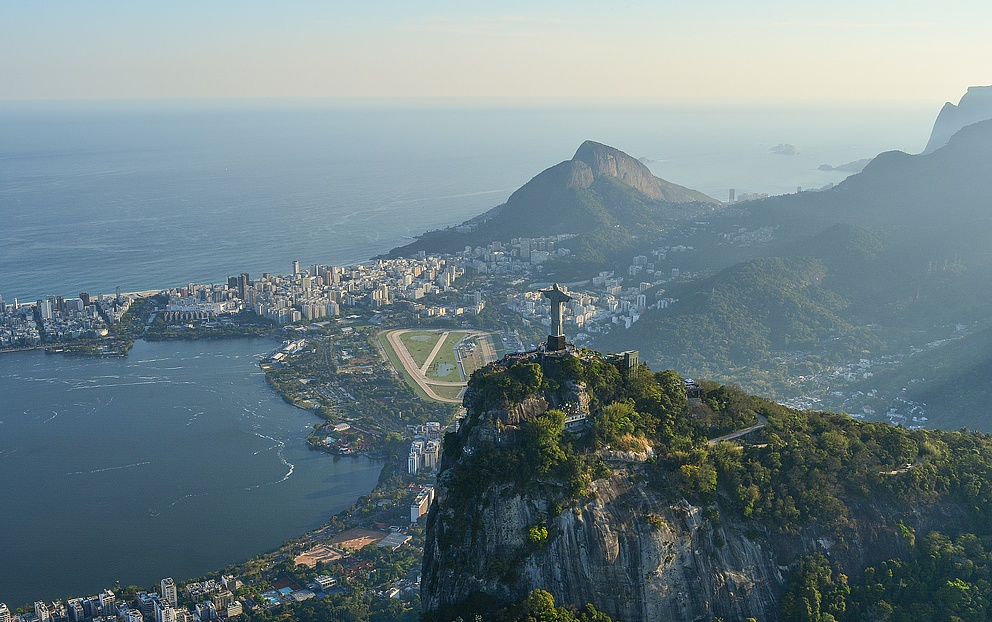

Contact
Press, Communications and Marketing
Tel.: +49 228 833-144
Fax: +49 228 833-441
presse[at]avh.de
Back in 2012, the two funding organisations initiated the CAPES-Humboldt Research Fellowship. It enables postdocs and experienced researchers from Brazil to spend extended periods working on research in Germany. Since the programme was launched in 2013, a total of 242 sponsorship-recipients from Brazil have benefitted, spending up to 24 months at institutions in Germany.
“The CAPES-Humboldt Fellowship not only enhanced my skills as a researcher but also equipped me with the tools to make a difference in my local community,” says Max Wendell Batista dos Anjos, who was a postdoc in climatology at TU Berlin in 2020. Anjos has a mission to share the knowledge he gained and the methods he learned with his colleagues and students at his own university in Natal. Moreover, he wants to campaign for a life that is fairer and more worth living both economically and in terms of climate policy.
Almost a third of the 242 CAPES-Humboldt research fellows are scientists like Anjos, 27 percent are humanities scholars and social scientists whilst 15 percent are engineering scientists.
“My career can be divided up into “before Germany” and “after Germany”. I am now much more experienced and have a much more comprehensive understanding of academia and research projects in chemistry. I had a fantastic mentor in Germany who had a positive influence on my work and independence,” says the chemist, Taicia Pacheco Fill, from the Universidade Estadual de Campinas, who was a visiting researcher at the Leibniz Institute for Natural Product Research and Infection Biology, Hans Knöll Institute, in Jena. She is one of the 26 percent of female fellows who have been selected for a research visit to Germany so far.
“We are delighted that applicants from all regions of such a diverse country as Brazil are enthusiastic about Germany. But, of course, we want to keep increasing the percentage of women in the programme in the coming years,” emphasises Frauke Bode, the programme manager of the CAPES-Humboldt Research Fellowship at the Humboldt Foundation in Bonn. Drawing attention to the support for families is part also part of this ambition. In the last ten years, nearly half of those selected made use of the relevant offers and brought their families with them to Germany. “One of the best days was when I was able to show my five-year-old son where I work. We spent a wonderful evening at the University of Göttingen, the Georgia Augusta, a memory that will stay with me forever,” says the historian Alexandre Mendes Cunha. “My husband and I had the opportunity to explore various German cities and immerse ourselves in the rich German culture. All these experiences bring a smile to my face when I reflect on my time in Germany,” Jaqueline Godoy Mesquita remembers. Her stay at the University of Giessen enabled her to drive her mathematical research and, as a result of the fellowship, she was granted a number of awards. She now tells her students all about the importance of networks and one of her doctoral candidates managed to acquire a DAAD scholarship.
Just like all Humboldtians, sponsorship-recipients from Brazil are eligible to benefit from alumni opportunities in the further course of their careers. One of the CAPES-Humboldt fellows of the early intakes, the Germanist Gerson Roberto Neumann, is an example. He regularly returns to Germany, “Being a Germanist, I need to be in contact with German colleagues and regularly visit Germany. To be able to visit institutes and universities as an alumnus in the Renewed Research Stay programme is very good and important.”
To this day, the former CAPES-Humboldt fellow, Juliana Pasquarelli Perez, still enthuses about the opportunity to spend time devoting herself entirely to research. This year, she became a Humboldt Foundation Ambassador Scientist in the Brazilian network.
Junior researchers from Brazil can apply for the CAPES-Humboldt Research Fellowship at any time. For more information, visit CAPES-Humboldt Fellowship.
